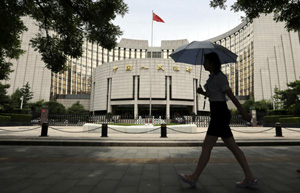CBRC chair: Simplify finance standards
Updated: 2014-09-25 06:56
By Jiang Xueqing in Tianjin(China Daily)
|
|||||||||||
Basel committee rules tend to drive up banks' compliance costs, Shang Fulin says
China Banking Regulatory Commission Chairman Shang Fulin on Wednesday urged members of the Basel Committee on Banking Supervision to work together to draw up simple, transparent international regulations.
In recent years, international financial regulations have become increasingly complex as the banking system becomes ever more complicated and vulnerable to financial risks. Many bankers complain that the rules have become onerous, especially in terms of capital buffers and liquidity. This situation drives up compliance costs for banks and reduces the effectiveness of supervision, Shang told the 18th International Conference of Banking Supervisors in Tianjin.
 |
 |
Stefan Ingves, chairman of the committee and governor of Sweden's central bank, called Shang's suggestions "very reasonable in the sense that they reflect a debate that is going on".
Ingves said that on the one hand, people want simple rules, but if the committee formulates such rules, sometimes they are too simple to apply to banks, which are "very complex institutions". On the other hand, if the committee has very complex rules, they become difficult to implement.
"So basically, the chairman's remarks were about how to try to find a reasonable balance between simplicity and complexity. That is of course something that matters in many emerging markets where you have a large number of banks that don't really do very complex banking business," he said. "I think we will end up eventually somewhere in between."
Shang also advised members of the Basel committee to promote the establishment of a fair and competitive international environment for supervision.
After the global financial crisis in 2008, many countries imposed regulatory changes that Shang said hinder fair competition in the international banking industry because they aim to protect the banking industries of their own countries.
Also, some international standards and rules are based on the business models and asset structures of banks in advanced countries, without giving consideration to the uneven development of the global banking industry, he said.
"We should realize that there is a clear disparity between developing countries and developed countries in terms of their stages of financial development and the depth of their financial markets. The committee should create a flexible international regulation system, which will serve different asset structures, different levels of complexity ... and different risk characteristics," he said.
He also suggested that the committee members push for cross-border cooperation on banking regulation, without regard to domestic interests, to prevent another global financial crisis.
With the joint efforts of its members, the committee could establish a cross-border cooperation mechanism for risk management and response to ensure long-term financial stability worldwide, he said.
Related Stories
Better banking service to real economy 2014-09-24 07:10
China supports FSB in reducing financial risks 2014-09-22 10:07
New financing channels 'pose risk to banks' 2014-09-10 07:35
Lenders may see slower profit growth this year 2014-07-01 07:38
Starting now, bank loans easier to get 2014-07-01 06:56
Banking profits hit $920b as Chinese lenders boom 2014-06-30 14:04
Today's Top News
UK to join airstrikes against IS in Iraq
Qatar forfeit basketball game
Express delivery sector opens up
Russia turns to RMB to thwart Western sanctions
China rebuffs EU on condemning life sentence
Emissions report tells only part of story, expert says
India triumphs in Mars mission
iPhone smugglers targeted
Hot Topics
Lunar probe , China growth forecasts, Emission rules get tougher, China seen through 'colored lens', International board,
Editor's Picks

|

|

|

|

|

|





